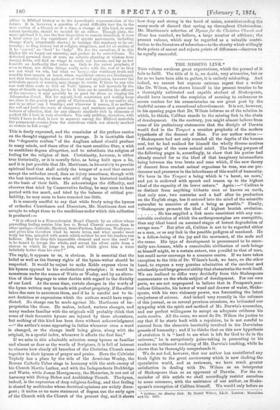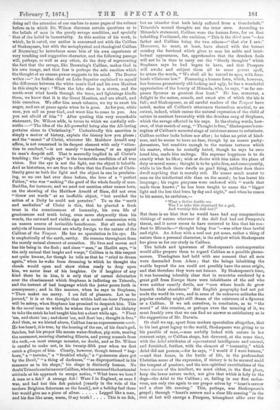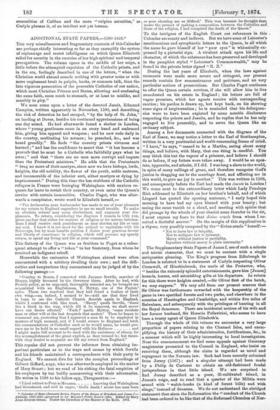THE MISSING LINK.*
THIS volume awakens great expectations, which the perusal of it fails to fulfil. The title of it is, no doubt, very attractive, but so far as we have been able to gather, it is entirely misleading. And indeed, we cannot but express extreme regret that a writer like Dr. Wilson, who shows himself in the present treatise to be a thoroughly cultivated and capable student of Shakespeare, should have incurred the suspicion of seeming to endeavour to secure readers for his commentaries on our great poet by the doubtful means of a sensational advertisement. It is not, however, in his opening pages that Dr. Wilson informs us of the relation in which, he thinks, Caliban stands to the missing link in the chain of development. On the contrary, you might armost believe from some of his preliminary statements that the disciple of Darwin would find in the Tempest a creation prophetic of the modern hypothesis of the descent of Man. For our author writes :— "Shakespeare had not only sounded all the depths of the human soul, but be had realised for himself the wholly diverse motives and cravings of the mere animal mind. The leading purpose of the following pages is, accordingly, to show that his genius had already created for us the ideal of that imaginary intermediate being between the true brute and man which, if the new theory of descent from crudest animal organisms be true, was our pre- decessor and precursor in the inheritance of this world of humanity. We have in the Tempest a being which is a beast, no more,' and yet is endowed with speech and reason up to the highest ideal of the capacity of its lower nature." Again :—" Caliban is so distinct from anything hitherto seen or known on earth, that only now, two centuries and a half after its production on the English stage, has it entered into the mind of the scientific naturalist to conceive of such a being as possible." Finally, "Shakespeare presents the ideal of highest brutish evolution.
He has supplied a link more consistent with any con- ceivable evolution of which the anthropomorphas are susceptible, than any ideal based on assumed stages of lowest degradation of savage man." But after all, Caliban is not to be regarded either as a man, or as any link in the possible pedigree of manhood. He is a fellow-being of the jay and the marmoset, of the mole and the crane. His type of development is pronounced to be essen- tially non-human, while a conceivable civilisation of such beings as himself might, to a certain extent, run parallel to that of man, but could never converge to a common centre. If we have taken exception to the title of Dr. Wilson's book, we have, on the other hand, to express a very genuine admiration of the candour and scholarship and large general ability that characterise the work itself. We are inclined to differ very decidedly from this Shakespeare commentator on the whole subject of development. For our own parts, we are not unprepared to believe that in Prospero'spar- venous Gibeonite, his hewer of wood and drawer of water, Shake- speare, with his rare visionary power, was forecasting the latest conjectures of science. And indeed very recently in the columns of this journal, as on several previous occasions, we intimated our sympathy with the spirit and method of Mr. Darwin's researches, and our perfect willingness to accept on adequate evidence his main results. All the same, we must do Dr. Wilson the justice to say that if he starts back with a repulsion, he is not careful to conceal from the elements inevitably involved in the Darwinian genesis of humanity ; and if he thinks that on this new hypothesis of evolution it is "hard to see what is left for God to do in the universe," he is scrupulously pains-taking in presenting to his readers an unbiassed rendering of Mr. Darwin's teaching, while he shows that he thoroughly comprehends it.
We do not feel, however, that our author has contributed any fresh lights to the great controversy which is now shaking the speculative world, and as reviewers, we have much greater satisfaction in dealing with Dr. Wilson as an interpreter of Shakespeare than as an opponent of Darwin. _ For the re- mainder of this article we shall accordingly restrict ourselves to some comment, with the assistance of our author, on Shake- speare's conception of Caliban himself. We would only before so * catiban: the Mining Link. By Daniel Wilson, LL.D. London Macmillan and Co. 1873.
doing call the attention of our readers to some pages of the volume before us in which Dr. Wilson discusses certain questions as to the beliefs of man in the purely savage condition, and specially that of the belief in immortality. In this section of his work, in which, be it noted, our author is concerned not with the Caliban of Shakespeare, but with the metaphysical and theological Caliban of Browning; he introduces some bits of his own experience of very touching and suggestive character, and-the following passage will, perhaps, as well as any other, do the duty of representing the fact that the savage, like Browning's Caliban, makes God in his own image, and that fear is perhaps the sole emotion which the thought of an unseen power suggests to his mind. The Doctor writes :—" An Indian chief on Lake Superior explained to myself the difference between the white man's God and his own Manitou in this simple way : 'When the lake rises in a storm, and the north-west wind howls through the trees, and lightnings kindle them, we know that it is the Great Manitou, and are afraid, and hide ourselves. We offer him much tobacco, we try to avert his -anger, and are at peace again when he is gone. As for you, white men, you call on your God, and want him to come to you. Are you not afraid of him " ? After quoting this very remarkable
tatement, Dr. Wilson adds, in terms to which we cordially sub- scribe :—" The idea of the All-powerful being also the All-loving pertains alone to Christianity." Undoubtedly this assertion is simply a matter of history, explain the history how you please ; and the " secret " of Christ, whatever Mr. Matthew Arnold may affirm, is not concerned in its deepest element with only "atten- tion to conduct,"—is not merely "inwardness," or an appeal to man's deepeist self. That is assuredly implied in all Christ's teaching ; the "single eye" is the inexorable condition of all true vision. But the eye is not the light, nor the object it beholds. And as historians, we are free to affirm that the Founder of Chris- tianity gave us both the light and the object in one in proclaim- ing, as no one had ever done before, the love of a "perfect Father," who was "seeking" the good of the whole family of man. Buddha, for instance, and we need not mention other names here, on the showing of the Matthew Arnold of Siam, did not even "throw out words" at an ineffable object, "but avoided the action of a Deity he could not perceive." To us the "merit and mediation" of Christ is this, that he planted a fresh trust in the consciousness of humanity, his own life of graciousness and truth being, even more eloquently than his words, the outward and visible sign of a rooted communion with an unseen source of invincible beneficence. But all such lofty subjects of human interest are wholly foreign to the nature of the Caliban of the Tempest. He has no speculation in his eye. He is emphatically of the earth, earthy. He reasons throughout from the merely animal element of sensation. He lives and moves and has his being in the flesh ; and since "man," as Hazlitt says, "is the only animal that laughs and weeps," Caliban is in this respect not quite human, for though he tells us that he cried to dream again," when he woke from dreaming in which he thought the clouds would open and 'show riches ready to drop upon itim, we never hear of his laughter. Or if laughter of any kind there be in him, it is only that of carnal delectation over the chastisement which Stephano is inflicting on Trinculo, and the torrent of bad language which the jester pours forth in consequence ; and in like manner, when he says to Stephan°, "Thou mast me merry. I am full of pleasure. Let us be jocund," it is at the thought that within half-an-hour Prospero will be asleep, when Stephan° has promised to despatch him. This is the moral tune to which he wishes the new god of his idolatry to take the catch he had taught him but a short while ago. "Flout 'em, and skout 'em ; and akout 'em, and flout 'em ; thought is free." And then, as we hinted above, Caliban has no supersensuous needs. He has heard, it is true, by the hearing of the ear, of his dam's god, Setebos, but his proper life meatis water-freshen, pig-nuts, snaring the marmoset, securing clustering filberts, and young seamela from the rock,—a most strange monster, no doubt, and as Dr. Wilson is careful to make out, in his twenty-fifth year when we first catch a glimpse of him. Clearly, however, though termed "hag- born," a "tortoise," a "freckled whelp," a "poisonous slave got by the Devil," "a thing of darkness," "as disproportioned in his manners as in his shape," his shape is distinctly human. No donbarineulo exclaims over Caliban, who has assumed the horizontal attitude at his approach to escape notice, "What have we here ? A man or a fish? A strange fish! Were I in England, as once I was, and had but this fish painted [exactly in the vein of the modern Brighton fisherman on the beach], not a holiday fool there
but would give me a piece of silver Legged like a man, and his fins like arms, warm, 0 my troth I . . . . This is no fish,
but an islander that hath lately suffered from a thunderbolt." Trinculo's second thoughts are the truer ones. According to Miranda's statement, Caliban wore the human form, for on first beholding Ferdinand, she exclaims, "This is the third man "—her father and Caliban being the two others—" that e'er I saw." Moreover, he must, at least, have shared with the bonnet monkey the forehead which gives to man his noble and intel- lectual appearance, for, apprehensive that the drunken fools will not be in time to carry out the "bloody thoughts" which Stephan° says he had begun to have, and that Prospero will awake and subject them all to some potent spell, he utters the words, "We shall all be turned to apes, with fore- heads villainous low." Possessing a human form, which, however, has become prematurely old-looking and ugly, he has a wonderful appreciation of the beauty of Miranda, who, he says, "as far sur- passes Syeorax as greatest does least." He has, moreover, a delight in the noises, sounds, and sweet airs of which the isle is full; and Shakespeare, as all careful readers of the Tempest have noted, makes all Caliban's utterances themselves musical, to an extent, indeed, which causes the natural expression of the child of nature to contrast favourably with the drunken song of Stephan°, which the savage affected in his cups. In the closing words, how- ever, of that snatch of song, "Thought is free," Shakespeare's con- ception of Caliban's unmoral stage of existence seems to culminate. Caliban neither looks before nor after ; he takes no print of kind- ness, and he seems to have no fear, though by no means pachy- flermatous, but sensitive enough to the various tortures which his master, whom he rootedly hated, though he says he once loved him, made him undergo. His supreme happiness is to do exactly what he likes; wish or desire with him takes the place of duty or moral sense ; thought is to be quite free, and consequently, while in his flesh there dwells no good thing, neither does these dwell anything that is morally evil. He 'comes much nearer to man on the intellectual side than on the moral ; he has learnt his language ; his vague purposes were endowed with "words that made them known ;" he has been taught to name the "bigger light and the less that burn by day and night," and when he comes to his senses, he exclaims,— " What a thrice double ass Was I to take this drunkard for a god, And worship this dull fool!"
But there is no hint that he would have had any compunctious visitings of nature whatever if the dull fool had cut Prospero'e throat, and it never seems to have occurred to him that his con- duct to Miranda—" thought being free "—was other than lawful and right. An Adam with a soul not yet come, rather a thing of nature than a personal character, is the subject which Shakespeare has given us for our study in Caliban.
The beliefs and ignorance of Shakespeare's contemporaries would alike prepare them to regard Caliban as a possible pheno- menon. Theologians had held with one consent that all men were descended from Adam ; that the beings inhabiting the worlds beyond the sea could not possibly have the same origin, and that therefore they were not human. By Shakespeare's time, it was becoming tolerably clear that in countries sundered by a great gulf from Europe there were inhabitants of the soil who were neither exactly devils, nor " men whose heads do grow beneath their shoulders." But English geography had not yet made the world its own, and in some of its unknown solitudes the popular credulity might still dream of the existence of a Sycorax or a Caliban. If we ask ourselves, in conclusion, as to "the moral" of this creation, or perhaps even the meaning of it, we must frankly own that we can find no answer so satisfactory as in the suggestions of Mr. Darwin.
Or shall we say, apart from modern speculation altogether, that In his last great legacy to the world, Shakespeare was giving to us his parable of man,—man awfully linked with nature in her coarsest satyr, or Caliban shape, but dowered, at the same time, with the Ariel attributes of supernatural intelligence and control, and furnished, further, with the element of "humanity," which Ariel did not possess,—for he says, "I would if I were human," —and that hence, in the battle of life, in the profoundest Christian sense of the expression, if victory is to be secured amid the tempest of passions, and the non-spiritual exercitations of the lumen &cum of the intellect, we must either, in the first place, keep the lower nature under, not give that which is holy to the dogs—the Ariel to the Caliban ; or, failing in our first endea- vour, can only rise again to our proper selves by "heart's sorrow and a clear life ensuing." This, perhaps, was Shakespeare's gospel ; through "heart's sorrow and a clear life ensuing" in the race at last will emerge a Prospero, triumphant alike over the sensualities of Caliban and the mere "vulpine astucities," as Carlyle phrases it, of an intellect not ) et human.




































 Previous page
Previous page